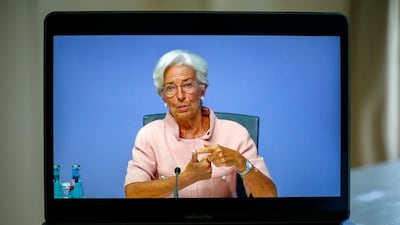The European Central Bank is carefully watching implications of a strong euro, ECB president Christine Lagarde said on Thursday as she confirmed the bank expected to use its stimulus package in full to help pull the region out of recession.
While warning that signs of a second wave of new coronavirus infections across Europe represented “headwinds” to the economy and that risks were skewed to the downside, Ms Lagarde announced a slight upgrade in the ECB’s 2020 growth forecast, buoyed notably by improved consumer demand.
The bank, grappling with inflation that turned negative last month for the first time since May 2016, maintained its forecast for 0.3 per cent inflation for the year as a whole, but said more months of negative price movements were yet to come.
“Clearly to the extent that the appreciation of the euro exercises negative pressure on prices, we have to monitor carefully such a matter, and this was extensively discussed in the Governing Council,” she said.
The euro has risen to around $1.20 due to various factors, including in reaction to the more discretionary inflation-targeting stance the US Federal Reserve announced last month, and after an EU-wide pandemic recovery fund was agreed.
Ms Lagarde, however, stressed that she would not comment on the level of the euro, and noted that the risk of outright deflation was not included in the ECB’s existing forecasts.
Four ECB board members, including Ms Lagarde and chief economist Philip Lane, are lined up to speak in the next 24 hours, suggesting the ECB is preparing to fine-tune its message if markets react poorly.
The euro jumped to a one-week high of $1.1888 after Ms Lagarde said incoming information on the economy pointed to a strong rebound in growth in the third quarter.
ECB policymakers had earlier left its policy unchanged, but with the economic recovery losing momentum, there is an expectation that the bank will at some point provide more stimulus to counter the record 12 per cent output drop seen in the second quarter.
Asked about a possible change in policy, Ms Lagarde said that council members believed existing measures were both “efficient and effective” and likely to be used in full.
“Under current circumstances, it is certainly very likely that the full envelope of PEPP will be used,” she said of the €1.35 trillion (Dh5.89tn) Pandemic Emergency Purchase programme. She added later that no change to PEPP had been discussed.
With Thursday’s decision, the ECB’s benchmark deposit rate remains at minus 0.5 per cent while the main rate remains at 0 per cent.

